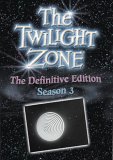| Reviews & Columns |
|
Reviews DVD TV on DVD Blu-ray 4K UHD International DVDs In Theaters Reviews by Studio Video Games Features Collector Series DVDs Easter Egg Database Interviews DVD Talk Radio Feature Articles Columns Anime Talk DVD Savant Horror DVDs The M.O.D. Squad Art House HD Talk Silent DVD
|
DVD Talk Forum |
|
|
| Resources |
|
DVD Price Search Customer Service #'s RCE Info Links |
|
Columns
|
|
|
Twilight Zone - Season 3 (The Definitive Edition), The
INTRODUCTION:
"You're traveling through another dimension, a dimension not only of sight and sound, but of mind; a journey into a wondrous land whose boundaries are that of imagination. Your next stop, the Twilight Zone."
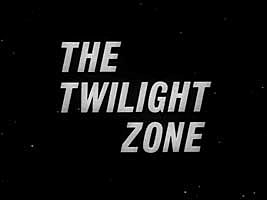
Two years after Rod Serling brought his most creative vision to television, The Twilight Zone was still struggling to maintain ratings stability. For the third season in a row, sponsorship was not a certainty, but with some hard work from CBS and Cayuga along with Serling's talent as a cigarette shill, the groundbreaking series found life once more as its third and longest season premiered on television sets across America on September 15, 1961. While the show would ultimately run for 5 seasons, these 37 episodes would mark the final run of The Twilight Zone as it was originally created. Not only would Rod Serling face significant creative burnout and numerous distractions in the final two years, but producer Buck Houghton -- the man primarily responsible for translating every episode from the page to the screen -- would leave the series at season's end. The show would continue, and there would still be some great episodes produced, but this third season marks the beginning of the end. Boasting standout episodes like "A Game of Pool" and "It's a Good Life", along with longtime classics "To Serve Man" and "Little Girl Lost", the third season of The Twilight Zone contains some of the show's most memorable efforts, and it is presented here once more in a "definitive" edition from Image Entertainment.
CONTENT:
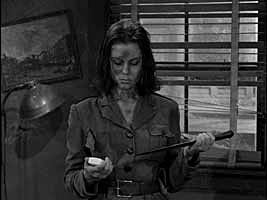 Many significant changes occurred between the first and second seasons of The Twilight Zone, and most of them are retained for this third effort. However, a few subtle changes appear, most notably another modification to the opening title sequence and narration. Moving away from the setting sun effect, each episode of the third season opens with a series of concentric rings spiraling into the distance while the title card slowly focuses into clarity and then shatters into the star field. For 1961, it was a relatively interesting effect and helped set the tone for the disorienting feeling viewers would have while watching the episode. The use of Marius Constant's theme remains as does Serling's on-screen introductions; unfortunately, those introductions are not as cleverly implemented as they were in the second season and come across more as perfunctory exercises in formula than anything else.
Many significant changes occurred between the first and second seasons of The Twilight Zone, and most of them are retained for this third effort. However, a few subtle changes appear, most notably another modification to the opening title sequence and narration. Moving away from the setting sun effect, each episode of the third season opens with a series of concentric rings spiraling into the distance while the title card slowly focuses into clarity and then shatters into the star field. For 1961, it was a relatively interesting effect and helped set the tone for the disorienting feeling viewers would have while watching the episode. The use of Marius Constant's theme remains as does Serling's on-screen introductions; unfortunately, those introductions are not as cleverly implemented as they were in the second season and come across more as perfunctory exercises in formula than anything else.
In a departure from the first two seasons, this third season of The Twilight Zone opens with a story not from the mind of Mr. Serling, and adding to its uniqueness it is not only written by Montgomery Pittman but directed by him as well. "Two" stars Charles Bronson (fresh from The Magnificent Seven) and a young Elizabeth Montgomery (just a few years before Bewitched), and despite being written by another author, it maintains a running premiere episode theme of isolation and the need for human companionship. 5 years after what seems to be a devastating world war, two soldiers from opposing forces find themselves alone in a destroyed world and must find a way to survive together. Both of the actors give excellent performances with precious little dialogue, and it is a fine way to open the season. It also sets the stage for one of the primary undercurrents of this third season: fear of nuclear war with the Russians. Serling goes to great pains in his opening narration to distract: "The time? Perhaps 100 years from now ... or sooner ... or perhaps it's already happened 2 million years ago. The place? The signposts are in English so that we may read them more easily, but the place is the Twilight Zone." However, it is abundantly obvious that Bronson is an American soldier, and Montgomery is a Russian invader.
After this initial episode, Serling once again takes over with 8 of the next 10 episodes credited to him (some adapted from short stories by others), and the first four of these are not particularly good. The first is "The Arrival", an intriguing mystery about an airplane that has miraculously landed at an airport without incident, but also without any crew or passengers. Harold J. Stone gives a strong performance as the lead investigator on the case, but the ultimate resolution to the story betrays the viewer and is way too similar to numerous other episodes from the show that were done better. Serling follows this effort with another episode that borrows heavily from a superior predecessor. "The Shelter" continues the theme of nuclear fear (disguised as an alien attack), starring Larry Gates as a small town's beloved family doctor and the only one on the street who had the forethought to build a bomb shelter. When attack seems imminent, the neighbors become like wild animals fighting amongst one another to find sanctuary in the single shelter. A similar concept was performed with much better execution in "The Monsters are Due on Maple Street", and "The Shelter" is bogged down with illogical and unrealistic characters as well as an eye-rolling level of self-righteousness from Serling. Sadly, this preachy style of writing would plague many of this season's episodes.
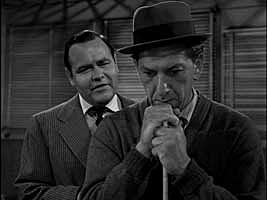 Serling's third effort continues the poor trend with one of the worst episodes of the show's entire run. Starring James Gregory as a Confederate Sergeant returning from the Civil War and Joanne Linville as the last resident of a lonely and burnt-out mansion, "The Passersby" is a wordy snoozefest made worse by the fact that the main characters seem oblivious to what is painfully obvious from the start. The final scene is downright laughable, and Serling is caught preaching to the audience once more. Finishing off this rough start is "The Mirror", featuring a very young Peter Falk as "Ramos Clemente" (*cough* Fidel Castro *cough*), a tyrant who becomes so consumed with fear that he constantly sees assassins in a nearby mirror. This episode fails on multiple levels, mostly stemming from the incredibly simplistic presentation of the character. The theme is strong -- people in power often find themselves consumed with looking over their shoulders -- but the execution is poor, and producer Buck Houghton freely admits it.
Serling's third effort continues the poor trend with one of the worst episodes of the show's entire run. Starring James Gregory as a Confederate Sergeant returning from the Civil War and Joanne Linville as the last resident of a lonely and burnt-out mansion, "The Passersby" is a wordy snoozefest made worse by the fact that the main characters seem oblivious to what is painfully obvious from the start. The final scene is downright laughable, and Serling is caught preaching to the audience once more. Finishing off this rough start is "The Mirror", featuring a very young Peter Falk as "Ramos Clemente" (*cough* Fidel Castro *cough*), a tyrant who becomes so consumed with fear that he constantly sees assassins in a nearby mirror. This episode fails on multiple levels, mostly stemming from the incredibly simplistic presentation of the character. The theme is strong -- people in power often find themselves consumed with looking over their shoulders -- but the execution is poor, and producer Buck Houghton freely admits it.
Thankfully, a reprieve from these poor stories comes from George Clayton Johnson (writer of the endearing "A Penny For Your Thoughts") with the 5th episode of the season and one of the best from the show's entire run, "A Game of Pool". Jack Klugman returns (previously giving a great performance in "A Passage For Trumpet") as Jesse Cardiff, a pool shark who spends every waking moment (and many sleeping ones as well) hunched over a table in a rundown pool hall. The recognized best pool player of all time is long dead, and Cardiff is convinced that if only they could play one game, Jesse would prove to be the best. Being a resident of the Twilight Zone, Jesse gets his wish, and what emerges is a wonderfully acted character tale that examines the nature of being the best at anything and the countless others who want ownership of that title. Co-starring Jonathan Winters in one of his earliest roles as Fats Brown and directed with style by veteran Buzz Kulik, "A Game of Pool" hits all the right notes (giving it a pass on some sloppy pool play) and is a prime example of the series at its finest.
With the 7th episode of the season, Montgomery Pittman returns as writer/director of "The Grave", an interpretation of a classic ghost story starring the great Lee Marvin as a gunslinger challenged to visit the grave of a man who swore to return from the dead. Pittman's direction is strong, as is Marvin's performance, but the tale is somewhat harmed by a shrill performance from Stafford Rep as the dead man's seemingly crazy sister. On the whole, though, Pittman's direction captures enough of an eerie quality to make it worthwhile.
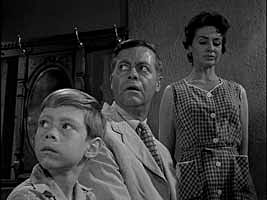 Serling returns with four more episodes in a row, starting with "It's a Good Life", an average script made hauntingly creepy by some truly fantastic performances from Cloris Leachman and John Larch. Bill Mumy (previously the creepy kid in "Long Distance Call") returns as another creepy kid, this time one who has the power to make objects and people disappear from existence with a simple thought. Nearly everyone and everything is gone with the exception of a few remaining townsfolk, and they have all learned how to act in such a way that will not upset little Anthony Freemont. The story is solid, and Mumy's performance is good for his age, but the strength of this episode stems from the amazing supporting performances from a group of people who live in sheer terror every moment of their lives, trying desperately to think positive thoughts and reinforce Anthony's horrible actions as "good" in order to avoid his wrath.
Serling returns with four more episodes in a row, starting with "It's a Good Life", an average script made hauntingly creepy by some truly fantastic performances from Cloris Leachman and John Larch. Bill Mumy (previously the creepy kid in "Long Distance Call") returns as another creepy kid, this time one who has the power to make objects and people disappear from existence with a simple thought. Nearly everyone and everything is gone with the exception of a few remaining townsfolk, and they have all learned how to act in such a way that will not upset little Anthony Freemont. The story is solid, and Mumy's performance is good for his age, but the strength of this episode stems from the amazing supporting performances from a group of people who live in sheer terror every moment of their lives, trying desperately to think positive thoughts and reinforce Anthony's horrible actions as "good" in order to avoid his wrath.
"Deaths-Head Revisited" follows with Oscar Beregi (previously in "The Rip Van Winkle Caper") in an intense role as a former S.S. Captain and sadistic operator of a Nazi concentration camp. Years later, for reasons that are thinly explained, he returns to his old stomping grounds only to find judgment waiting for him in the darkness. Beregi's performance is intense and effective for the most part, but yet another script is bogged down with an increasingly preachy style from Serling. Nazis are bad, mmkay. Perhaps in 1961, something like this may have worked better, but the writing is so simplistic and one-sided in its presentation that watching it now, it loses all effectiveness and crumbles under its own self-righteousness.
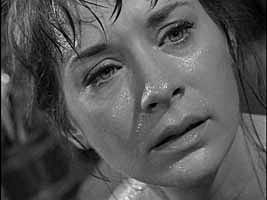 Serling continues his run with a surprisingly good episode entitled "The Midnight Sun". Nevermind how, but Earth is moving closer to the sun with each passing day, and nearly everyone has fled north in search of cooler temperatures. Two women remain, however, in a now abandoned apartment, and their emotional struggle with the impending situation makes for some great dramatic content. Lois Nettleton and Betty Garde give nuanced and convincing performances in what is largely a character study of two individuals facing an impossible future. Anton Leader (previously the director of "Long Live Walter Jameson") returns to the show and once again captures a wonderfully unique special effect on camera. With help from a powerful score by frequent contributor Van Cleave, the sense of dread and fear are palpable, and as a viewer you can almost feel the intense heat through the television screen.
Serling continues his run with a surprisingly good episode entitled "The Midnight Sun". Nevermind how, but Earth is moving closer to the sun with each passing day, and nearly everyone has fled north in search of cooler temperatures. Two women remain, however, in a now abandoned apartment, and their emotional struggle with the impending situation makes for some great dramatic content. Lois Nettleton and Betty Garde give nuanced and convincing performances in what is largely a character study of two individuals facing an impossible future. Anton Leader (previously the director of "Long Live Walter Jameson") returns to the show and once again captures a wonderfully unique special effect on camera. With help from a powerful score by frequent contributor Van Cleave, the sense of dread and fear are palpable, and as a viewer you can almost feel the intense heat through the television screen.
Adapting another short story, the season continues with Serling's script for "Still Valley", a dreadfully pretentious and silly tale about a Confederate scout who comes across an old student of witchcraft claiming to have the power to freeze entire armies at will. As this is his final day on Earth (his witchcraft power tells him this), he cannot win the Civil War on his own, but he can give his "Witchcraft" book to the scout to finish the job. The entire piece defies logic and serves only as a path to yet another clichéd speech. In the teaser, Serling says, "this one is for Civil War buffs and students of the occult." No it's not.
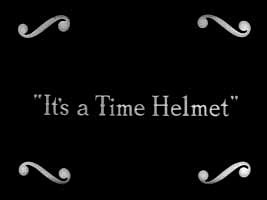 Charles Beaumont returns with his first effort of this third season in a piece entitled, "The Jungle". In the first season, he penned an awkward story of the macabre in "Perchance to Dream", and "The Jungle" roams in similar territory. This time, however, the effort is somewhat of a success, largely because of the talents of director William Claxton and star John Dehner. Alan Richards (Dehner) is an engineer for a high-powered New York hydroelectric company that is setting up shop in Africa. On his latest trip, he was cursed by a group of witch doctors, and after ignoring the superstitious warnings of his wife, he finds that the city has become a figurative jungle from which he cannot seem to escape. "The Jungle" is little more than one character's journey through a frightful situation, but the direction is such that the relatively thin story becomes a tense and effective half-hour of television.
Charles Beaumont returns with his first effort of this third season in a piece entitled, "The Jungle". In the first season, he penned an awkward story of the macabre in "Perchance to Dream", and "The Jungle" roams in similar territory. This time, however, the effort is somewhat of a success, largely because of the talents of director William Claxton and star John Dehner. Alan Richards (Dehner) is an engineer for a high-powered New York hydroelectric company that is setting up shop in Africa. On his latest trip, he was cursed by a group of witch doctors, and after ignoring the superstitious warnings of his wife, he finds that the city has become a figurative jungle from which he cannot seem to escape. "The Jungle" is little more than one character's journey through a frightful situation, but the direction is such that the relatively thin story becomes a tense and effective half-hour of television.
Frequent writer Richard Matheson immediately follows with his own first entry of the season, "Once Upon a Time". Unlike any episode of The Twilight Zone before it or since, "Once Upon a Time" stars the legendary Buster Keaton in a role that only he could play. The story is simple, almost intentionally so to maintain the humor. Mulligan (Keaton) is a bitter janitor for two young inventors in the year 1890. Unhappy with the modern inconveniences, he borrows the inventors' "time helmet" and travels to 1962. With the help of his new friend Rollo (Stanley Adams), he soon realizes that the grass is always greener in the other time. Matheson proved he could do comedy with the first season's "A World of His Own", and this episode follows in that tradition. Most notably, all the scenes from 1890 are presented like a classic silent film, complete with dialog cards and saloon piano accompaniment. It is a silly slapstick piece, but it makes for a fun departure from the standard formula.
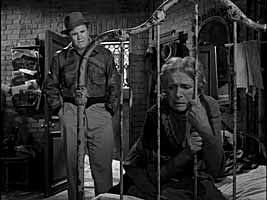 Once more, Serling returns to the forefront with "Five Characters in Search of an Exit". Five characters are trapped in a cylindrical room with no idea who they are or how they got there. As a character piece, this episode could have worked, but the resolution to the mystery is so painfully obvious from the start that nearly all its effectiveness is lost. "A Quality of Mercy" follows (note: Serling mistakenly promotes it as "The Quality of Mercy"), starring Dean Stockwell as an American Lieutenant who just showed up to battle in August of 1945 and is looking to make his mark before all the fighting ends. Stereotypical and moderately insulting, there is little in this episode that wasn't already covered in "The Purple Testament" and "Still Valley", and yet again (see a pattern), the episode ends with some speechifying that rings a bit hollow. The one gem in this episode is Albert Salmi (previously in "The Execution"), who gives a wonderful performance as a weary soldier who is tired of killing and wants no part of the Lieutenant's instructions.
Once more, Serling returns to the forefront with "Five Characters in Search of an Exit". Five characters are trapped in a cylindrical room with no idea who they are or how they got there. As a character piece, this episode could have worked, but the resolution to the mystery is so painfully obvious from the start that nearly all its effectiveness is lost. "A Quality of Mercy" follows (note: Serling mistakenly promotes it as "The Quality of Mercy"), starring Dean Stockwell as an American Lieutenant who just showed up to battle in August of 1945 and is looking to make his mark before all the fighting ends. Stereotypical and moderately insulting, there is little in this episode that wasn't already covered in "The Purple Testament" and "Still Valley", and yet again (see a pattern), the episode ends with some speechifying that rings a bit hollow. The one gem in this episode is Albert Salmi (previously in "The Execution"), who gives a wonderful performance as a weary soldier who is tired of killing and wants no part of the Lieutenant's instructions.
Adding a much needed sentimental touch, George Clayton Johnson's story "Nothing in the Dark" stars Gladys Cooper as an old woman running from "Mr. Death" and an incredibly green Robert Redford as the man she fears has arrived to take her life. The first of many episodes this season that would tackle the subject of aging, "Nothing in the Dark" is a moving story about our inherent human fear of the unknown, the greatest of which is death. Redford's work is surprisingly stiff, but Gladys Cooper's performance is so strong that it overshadows any other negatives, and it's the type of sentimental Twilight Zone episode only George Clayton Johnson could provide.
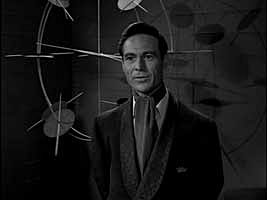 "One More Pallbearer" is unfortunately another unsuccessful effort from the almost certainly overworked Serling. Paul Radin (Joseph Wiseman) is a wealthy eccentric who has maintained intense grudges for three authority figures from his past: a school teacher, a reverend, and a colonel. Once more leaning on the theme of nuclear fear, Radin summons these three individuals to his mansion in hopes of tricking them with an elaborate hoax, that the world is ending and his personal shelter is their only possible sanctuary. In concept, there is an interesting quality to this story, but the execution is exceedingly verbose and lacks any genuine heart or emotion. It's not possible to identify with any of the four characters on any significant level, and the ultimate resolution to the episode seems tacked on for effect.
"One More Pallbearer" is unfortunately another unsuccessful effort from the almost certainly overworked Serling. Paul Radin (Joseph Wiseman) is a wealthy eccentric who has maintained intense grudges for three authority figures from his past: a school teacher, a reverend, and a colonel. Once more leaning on the theme of nuclear fear, Radin summons these three individuals to his mansion in hopes of tricking them with an elaborate hoax, that the world is ending and his personal shelter is their only possible sanctuary. In concept, there is an interesting quality to this story, but the execution is exceedingly verbose and lacks any genuine heart or emotion. It's not possible to identify with any of the four characters on any significant level, and the ultimate resolution to the episode seems tacked on for effect.
Charles Beaumont's second credit of the season comes around the midway point with "Dead Man's Shoes", a story that in actuality was ghost-written by OCee Ritch. This wasn't the first time Beaumont had his name attached to someone else's script, and it wouldn't be the last. In this tale, a homeless man acquires some expensive shoes off a dead man in a nearby alley, and he soon finds that the shoes control his actions. The basic premise for the episode and the motivation behind the shoes is somewhat interesting, but the story drags too much and comes across a bit cartoonish.
Two of the next four episodes are contributed by a newcomer to The Twilight Zone team, a Southerner named Earl Hamner, Jr. Raised in the Blue Ridge Mountains, Hamner brought a country perspective to the show, and it oozes from his first episode, "The Hunt". Hyder Simpson (Arthur Hunnicut) is a simple old man who enjoys nothing more than 'coon huntin' with his faithful dog Rip. After the two of them dive into a river after a particularly mischievous raccoon, their lives begin to change. The overall theme for this episode is pretty clever, but it suffers from some pretty poor performances, an overly simplistic view of country life, and a meandering journey to the ultimate punch-line. Hamner would later express his displeasure over the way the episode was handled, feeling it should have been approached with much more comedy than it was. Hamner would go on to pen 7 more episodes for the series including "A Piano in the House" for this third season. Noted British actor Barry Morse (later to star as Lt. Gerard on The Fugitive and Professor Bergman on Space: 1999) plays the role of a theater critic who stumbles upon a player piano that will reveal the "inner self" of an unsuspecting bystander. As expected, Morse's performance is fantastic; unfortunately, the characterization of him and those around him is too one-dimensional, a problem that plagued both of Hamner's scripts this season.
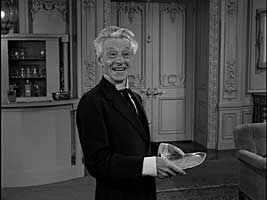 Mixed in between Hamner's two efforts are two of the more entertaining episodes of the season. The first comes from Mr. Serling, whose comedic attempt with "The Mighty Casey" from the first season was a complete failure, but he succeeds in many ways with "Showdown with Rance McGrew". McGrew (Larry Blyden) is a loudmouth and demanding actor who portrays a Wild West gunslinger on a hit television series. After a series of hilarious screw-ups on his latest shoot, he finds himself caught in a rather alarming predicament: the ghosts of the real-life characters whom he's bested on the show are not to pleased with the way they've been presented, and they have something to say about it. Thematically, there is nothing overly unique about the episode itself, but the shenanigans of McGrew make for some great comedy and entertainment.
Mixed in between Hamner's two efforts are two of the more entertaining episodes of the season. The first comes from Mr. Serling, whose comedic attempt with "The Mighty Casey" from the first season was a complete failure, but he succeeds in many ways with "Showdown with Rance McGrew". McGrew (Larry Blyden) is a loudmouth and demanding actor who portrays a Wild West gunslinger on a hit television series. After a series of hilarious screw-ups on his latest shoot, he finds himself caught in a rather alarming predicament: the ghosts of the real-life characters whom he's bested on the show are not to pleased with the way they've been presented, and they have something to say about it. Thematically, there is nothing overly unique about the episode itself, but the shenanigans of McGrew make for some great comedy and entertainment.
Switching gears from the comedy, George Clayton Johnson contributes his final script of the season and another wonderfully sentimental piece, "Kick the Can". One of the three classics that would make its way to the feature film, "Kick the Can" returns to the running theme of growing old and facing our own mortality. Ernest Truex gives a passionate and heart-warming performance as an elderly man living his final days in a rest home and longing for a time when his only cares were running through a sprinkler and playing "kick the can" with the neighborhood children. It is a moving story, with fabulous supporting performances (including a return for television legend Burt Mustin), effective scoring, and skillful direction. Sadly, having given us four of the best episodes of the series, this would be Johnson's final script for The Twilight Zone.
Montgomery Pittman would return for the third and final time this season as both writer and director for "The Last Rites of Jeff Myrtlebank". James Best (previously in "The Grave") stars in the title role as a man who abruptly awakens from death in the middle of his own funeral. There is nothing particularly wrong with him, other than some potential personality changes, but the townspeople exhibit a profound fear of this strange occurrence, and they want no part of it. Skillfully walking the line between comedy and drama, it is an effective episode and is probably Pittman's best work on the show. In a bit of comic gold, Edgar Buchanan steals the show with a character that would soon evolve into Uncle Joe Carson on Petticoat Junction. Shocked and dismayed by the fact that a patient he pronounced dead is now among the living and in defense against the angry friends and relatives, he hilarious exclaims that this is a rare case, never before seen in the United States, known in the Latin as "Ipso Suspendo Animation".
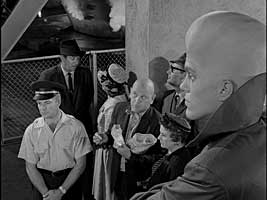 Quite possibly the most famous closing line of a Twilight Zone episode appears in Serling's next effort, an adaptation of Damon Knight's short story, "To Serve Man". In a slight departure for the show, the episode begins with a narration from one of the characters, Chambers (Lloyd Bochner), an irritated and defeated man aboard some form of spaceship. He proceeds to tell the story of how he came to this particular circumstance and just what it was like when the Kanamits arrived from another planet to provide peace and prosperity to the human race. "To Serve Man" is an interesting tale that succeeds for the most part, but the original story is far more convincing. For as much as he understood character motivation, Serling's scripts often exhibit a lack of understanding for some basic science common sense. In this episode, he has a team of cryptographers breaking the "code" of an alien language instead of Knight's much more logical original concept of linguistic experts using a limited English-to-Kanamit dictionary and along with sample Kanamit texts to decipher the language. Dramatically, it also doesn't make any sense why the Kanamit oddly drops an important book on a table for no particular reason other than it's important to the plot. The logic of the original is much stronger, indicating that suspicious humans find a way to steal the book that is the crux of the story. Still, in spite of these flaws, it is a fun episode with a classic finale.
Quite possibly the most famous closing line of a Twilight Zone episode appears in Serling's next effort, an adaptation of Damon Knight's short story, "To Serve Man". In a slight departure for the show, the episode begins with a narration from one of the characters, Chambers (Lloyd Bochner), an irritated and defeated man aboard some form of spaceship. He proceeds to tell the story of how he came to this particular circumstance and just what it was like when the Kanamits arrived from another planet to provide peace and prosperity to the human race. "To Serve Man" is an interesting tale that succeeds for the most part, but the original story is far more convincing. For as much as he understood character motivation, Serling's scripts often exhibit a lack of understanding for some basic science common sense. In this episode, he has a team of cryptographers breaking the "code" of an alien language instead of Knight's much more logical original concept of linguistic experts using a limited English-to-Kanamit dictionary and along with sample Kanamit texts to decipher the language. Dramatically, it also doesn't make any sense why the Kanamit oddly drops an important book on a table for no particular reason other than it's important to the plot. The logic of the original is much stronger, indicating that suspicious humans find a way to steal the book that is the crux of the story. Still, in spite of these flaws, it is a fun episode with a classic finale.
"The Fugitive" is the first of Charles Beaumont's final two episodes for this season, and it continues the relatively strong run of content. Interestingly, it's not the typically macabre or cynical story Beaumont is known for presenting. J. Pat O'Malley plays "Old Ben", a grandfatherly figure for a group of young children who entertains them with his vast array of magical powers, particularly a young girl with a leg brace named Jenny (Susan Gordon). Surprisingly charming, this is a pleasant story of two people who have found comfort in their friendship. Unfortunately for Ben, two suspicious men are on his trail and are not too thrilled with the way he's leading his life. The only drawback to this episode is that Jenny's guardian, Mrs. Gann (Nancy Kulp), is too one-dimensional as an attempt to keep the audience from sympathizing with her in any way.
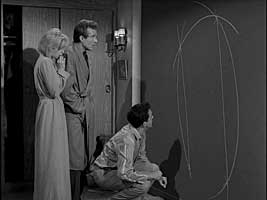 Beaumont's final episode is a return to form in a tale about a man, David Gurney (Richard Long), who wakes up one morning to find that no one knows who he is. His wife, his coworkers, his friends, and even his mother do not even know that he exists, and he is caught within a nightmare that echoes one of the major premises of the series: something amazing or fearful happening to you, the reality of which you cannot convince anyone else. This is the type of story that could go awry with illogical and manic behavior from the characters, but Gurney's reactions are the way you would expect someone to act under such extraordinary circumstances, and Long sells the performance very well. The final resolution is a bit of a cheat for the audience, but as a dramatic story of the incredible, it works nonetheless.
Beaumont's final episode is a return to form in a tale about a man, David Gurney (Richard Long), who wakes up one morning to find that no one knows who he is. His wife, his coworkers, his friends, and even his mother do not even know that he exists, and he is caught within a nightmare that echoes one of the major premises of the series: something amazing or fearful happening to you, the reality of which you cannot convince anyone else. This is the type of story that could go awry with illogical and manic behavior from the characters, but Gurney's reactions are the way you would expect someone to act under such extraordinary circumstances, and Long sells the performance very well. The final resolution is a bit of a cheat for the audience, but as a dramatic story of the incredible, it works nonetheless.
Richard Matheson's considerable talents are called upon for a second time this season with "Little Girl Lost", an episode that was hilariously parodied in The Simpsons' "Treehouse of Horror VI". Charles Aidman (who would later become the narrator for the series when it returned in 1985) stars as "Bill", a scientist/physicist/plot device? who rushes to the aid of his neighbors when their daughter "disappears". Before even checking for her in the closet, he quickly establishes that she has fallen through a portal in her bedroom that leads to the 4th dimension. With a shrill performance from Sarah Marshall as the distraught mother and some laughably silly dialogue, "Little Girl Lost" borders on complete failure, but Aidman delivers a strong performance in spite of this, and the legendary Bernard Herrmann provides a haunting score that makes the episode tolerable and somewhat interesting in spite of itself.
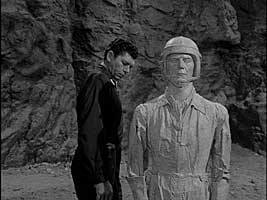 With the contributions of most of the other writers out of the way, eight of the final ten episodes of the season come from the man himself, beginning with "The Little People". Starring Joe Maross and Claude Akins (previously in "The Monsters are Due on Maple Street"), Serling makes his way back to type of character development that would prove his greatest strength as a writer. Peter Craig (Maross) and William Fletcher (Akins) are astronauts making a brief stop for repairs on a distant asteroid, but before they are able to leave, Craig stumbles upon an entire civilization of ant-sized creatures and becomes consumed with his delusions of godhood. As a character study, it isn't Serling's finest work, but it is closer to the types of stories that make the show great than many of his earlier efforts in the season.
With the contributions of most of the other writers out of the way, eight of the final ten episodes of the season come from the man himself, beginning with "The Little People". Starring Joe Maross and Claude Akins (previously in "The Monsters are Due on Maple Street"), Serling makes his way back to type of character development that would prove his greatest strength as a writer. Peter Craig (Maross) and William Fletcher (Akins) are astronauts making a brief stop for repairs on a distant asteroid, but before they are able to leave, Craig stumbles upon an entire civilization of ant-sized creatures and becomes consumed with his delusions of godhood. As a character study, it isn't Serling's finest work, but it is closer to the types of stories that make the show great than many of his earlier efforts in the season.
Serling follows with "Four O'Clock", adapted from Price Day's short story, starring Theodore Bikel as Oliver Crangle, a man who is obsessed with ridding the world of "evil" and who has dedicated every waking moment to amassing a database of all the bad things other people have done. Bikel's performance is energetic and unflinching, but the material is too thin to support a full episode and gives the viewer too much time to figure out the episode's obvious conclusion.
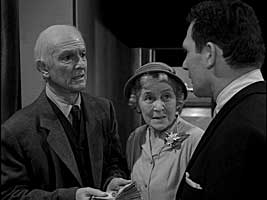 Comedy takes center-stage once more with "Hocus-Pocus and Frisby", and Serling shows again that his earlier failures at humor were not indicative of his talent. Andy Devine stars as "Frisby", an overweight storekeeper in a small town who is an endless reservoir of outrageous tall tales. If he were to be taken seriously, not only would he have a good 38 advanced degrees from various colleges and universities, but his service in both World Wars and his contributions to the evolution of the automobile would be the stuff of legend. Of course, no one in the town believes him, including his pal Mitchell (Howard McNear, perfectly cast from The Andy Griffith Show) ... but what if a group of aliens, unfamiliar with the concept of "lying", stumble upon this man and believe all of his stories. Andy Devine's antics are a delight to watch, and the absurdity of his stories make for a very entertaining half-hour of television.
Comedy takes center-stage once more with "Hocus-Pocus and Frisby", and Serling shows again that his earlier failures at humor were not indicative of his talent. Andy Devine stars as "Frisby", an overweight storekeeper in a small town who is an endless reservoir of outrageous tall tales. If he were to be taken seriously, not only would he have a good 38 advanced degrees from various colleges and universities, but his service in both World Wars and his contributions to the evolution of the automobile would be the stuff of legend. Of course, no one in the town believes him, including his pal Mitchell (Howard McNear, perfectly cast from The Andy Griffith Show) ... but what if a group of aliens, unfamiliar with the concept of "lying", stumble upon this man and believe all of his stories. Andy Devine's antics are a delight to watch, and the absurdity of his stories make for a very entertaining half-hour of television.
Serling's next effort takes a far different tone and once more returns to the theme of human mortality and the difficulties of growing old. "The Trade-Ins" is a touching tale about a married couple of 50 years who come upon the "New Life Corporation" and investigate the promise of having their spirits be transplanted to young and healthy new bodies. Joseph Schildkraut (previously in "Deaths-Head Revisited") and Alma Platt give beautiful performances as a loving twosome who are not ready to face their own mortality but are unwilling to live without each other. It's a story of love and companionship and is a reminder that when Serling focuses intently on his characters and not so much on gimmick endings or preachy messages, beautiful episodes are the result.
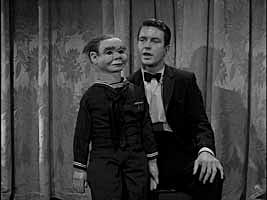 Sadly, greatness is often followed by mediocrity, and Serling's 5th episode in a row, "The Gift", exhibits the writer at his most pretentious. "Mr. Williams" (Geoffrey Horne) is an alien who mysteriously arrives in a Mexican town. He means no one any harm, but the townsfolk hunt him down and kill him out of fear. Echoing "The Shelter", this episode is a retread of a retread made worse by terrible performances from the actors and insultingly stereotypical behavior attributed to Mexicans.
Sadly, greatness is often followed by mediocrity, and Serling's 5th episode in a row, "The Gift", exhibits the writer at his most pretentious. "Mr. Williams" (Geoffrey Horne) is an alien who mysteriously arrives in a Mexican town. He means no one any harm, but the townsfolk hunt him down and kill him out of fear. Echoing "The Shelter", this episode is a retread of a retread made worse by terrible performances from the actors and insultingly stereotypical behavior attributed to Mexicans.
For the 33rd (that's right ... 33rd!) episode of the season, Cliff Robertson returns (previously in "A Hundred Yards Over the Rim"), and he gives another fantastic performance as a struggling ventriloquist (Jerry Etherson) who is haunted by his wooden stage partner. "The Dummy" has the potential to be a miserable failure, but Robertson is such a strong presence on screen that he carries the entire show. The final shot is not effective as it could be, but Etherson's terror is captured very well, and it makes for a creepy tale of which Charles Beaumont would have been proud.
 Richard Matheson's final contribution to the season is not one of his best efforts, although one could argue that the problem is less with the script and more with its execution on screen. Never one to pull punches, Matheson willingly admits that he hated the way it was shot, particularly the ending. "Young Man's Fancy" concerns Virginia (Phyllis Thaxter) and Alex Walker (Alex Nicol), newlyweds who have made one last trip to Alex's childhood home as they prepare to sell it and move on with their lives. However, the presence of Alex's recently deceased mother can still be felt in the house, and his longing for his childhood has a strange effect on him that terrifies Virginia. Thaxter's performance is solid, but Nicol seems to be slumbering through the part, and the sense of horror that is obviously intended never truly translates to the screen.
Richard Matheson's final contribution to the season is not one of his best efforts, although one could argue that the problem is less with the script and more with its execution on screen. Never one to pull punches, Matheson willingly admits that he hated the way it was shot, particularly the ending. "Young Man's Fancy" concerns Virginia (Phyllis Thaxter) and Alex Walker (Alex Nicol), newlyweds who have made one last trip to Alex's childhood home as they prepare to sell it and move on with their lives. However, the presence of Alex's recently deceased mother can still be felt in the house, and his longing for his childhood has a strange effect on him that terrifies Virginia. Thaxter's performance is solid, but Nicol seems to be slumbering through the part, and the sense of horror that is obviously intended never truly translates to the screen.
With only three episodes to go, The Twilight Zone turned to famed science fiction master Ray Bradbury and his short story "I Sing the Body Electric". Originally, Bradbury was supposed to be much more creatively involved with the show, but for various reasons, that plan did not come to fruition, and over the years it would create some resentment and bitterness between the two parties. In this episode, ultimately his only contribution to the series, a father (David White, completing the Bewitched foursome with Montgomery, York, and Moorehead ... poor Dick Sargent) tries to comfort his three children after the death of their mother, and he turns to a company that will supply him with a robotic "grandma" that will never die. Plagued by numerous re-shoots and multiple directors, the episode never fully takes off, although Josephine Hutchinson is excellent as the robotic companion, and it is a somewhat warm tale, even if not completely effective.
As with the previous season, Serling closes with the final two episodes, and like all three of the opening seasons, the penultimate episode is a heavy attempt at comedy. This time it manifests itself in a retread of the first season's "Mr. Bevis" in a tale called "Cavender is Coming". Starring Carol Burnett as the clumsy Agnes Grep and Jesse White as Cavender, an angel in search of his wings, "Cavender is Coming" was a transparent pilot for a series in which Cavender would play guardian angel to some poor sap from week to week. Borrowing heavily from It's a Wonderful Life, the episode is not particularly strong, but it is certainly an improvement over "Mr. Bevis", and Carol Burnett's immense talent gives the show enough life to survive.
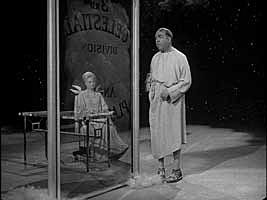 Interestingly enough, the season finale also borrows from It's a Wonderful Life and once more handles the issue of human mortality and the brief nature of our lives. Fortunately, while echoing themes already explored, "The Changing of the Guard" is a moving story carried wonderfully by talented British actor Donald Pleasence (just a year before The Great Escape). A poetry teacher at a school for young boys, Professor Fowler (Pleasence) is being asked to retire after 50 years of service. However, as he sees it, his career is coming to an end without achieving any significant accomplishment. The climax of this episode is relatively predictable, but Pleasence's performance is so nuanced and effective that the story remains strong regardless of whether you know what happens or not.
Interestingly enough, the season finale also borrows from It's a Wonderful Life and once more handles the issue of human mortality and the brief nature of our lives. Fortunately, while echoing themes already explored, "The Changing of the Guard" is a moving story carried wonderfully by talented British actor Donald Pleasence (just a year before The Great Escape). A poetry teacher at a school for young boys, Professor Fowler (Pleasence) is being asked to retire after 50 years of service. However, as he sees it, his career is coming to an end without achieving any significant accomplishment. The climax of this episode is relatively predictable, but Pleasence's performance is so nuanced and effective that the story remains strong regardless of whether you know what happens or not.
Despite all its ups and downs, for the third season in a row, The Twilight Zone manages to finish on a high note with interesting writing and fantastic performances. With 37 episodes, the longest of any of the seasons, this third season marks the end of The Twilight Zone as helmed by Rod Serling, Buck Houghton, and George T. Clemens. Clemens would remain in diminished capacity, and Serling would continue writing scripts and providing narrations (although distracted by his teaching responsibilities), but the show would never completely be the same. For better or worse, these first three seasons are the core of this landmark television series, and the third season presented in this set provides a mixture of terribly pretentious soozefests, creatively humorous fun, and powerfully insightful drama. On the whole, the content does not reach the strength of the first season, but few of the episodes are as dreadfully bad as some that popped up in the second season. An interesting mix of stories, this third season ranks the second best of those released, and it is certainly worthy of exploration.
PRESENTATION:
This "definitive edition" of the third season of The Twilight Zone is presented very much like the first season. In fact, the notable improvement of the second season has been abandoned, and the effective clasping mechanisms in the slimcases have been replaced with the original plastic knobs. I found this most disappointing.
Once again, the episodes are presented in their entirety with every second of possible footage thrown onto the DVDs. Interestingly, this season's closing ads focus less on promoting CBS shows (with the exception of Gunsmoke) and more heavily lean towards public service announcements about supporting the community, helping the mentally ill, and preventing forest fires. Just like the other two seasons, this release is a time capsule to 1961-1962, and it is an absolute delight for television fans. This year, however, Serling has a new brand of smokes. Oasis is out, and Chesterfield is in, and he does not hesitate to shill for them at the close of numerous episodes, all of which is included in this set: "Tobacco too mild to filter. Pleasure too good to miss." Of note, Serling's teaser for the upcoming episode is not included (presumably lost) on "The Last Rites of Jeff Myrtlebank" or "Cavender is Coming".
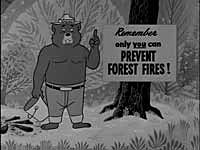 | 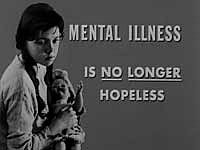 | 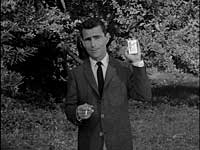 |
Like the original broadcasts, this third season release is in a 4:3 aspect ratio with a mono audio track. As before, the episodes have been re-mastered with, in many cases, staggeringly improved results. Fortunately, this release is not plagued with the videotaped episodes that looked so terrible in season two. However, I am disappointed to report that there are a few episodes in this season that have not been restored to perfection. "The Hunt" and "The Fugitive" both exhibit some audio issues, and print damage is visible on "Showdown with Rance McGrew" and "Hocus-Pocus and Frisby". Also, "Cavender is Coming" has quite a few specs and scratches throughout. To be fair, these are relatively minor issues, and the episodes look far better than they ever have before, but the imperfections should be pointed out. Some more screenshots:
| Old | New |
|---|---|
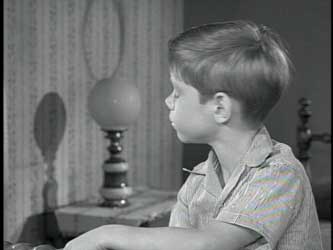 | 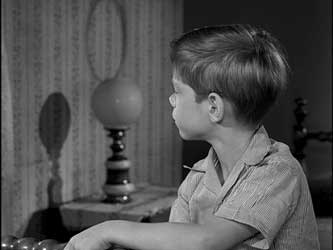 |
| Old | New |
|---|---|
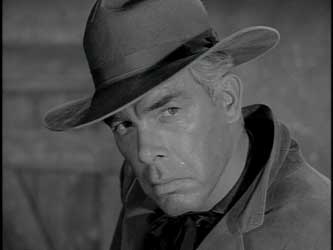 | 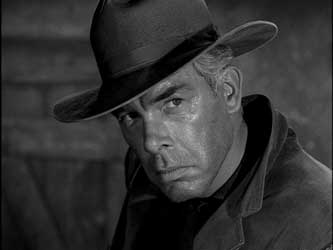 |
| Old | New |
|---|---|
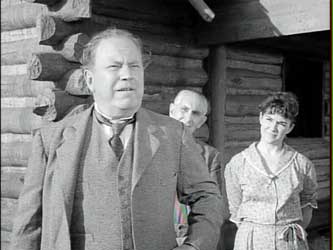 | 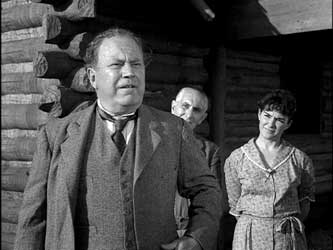 |
The menus are organized in the same simple format as the first two seasons. The montage of the series' classic moments runs once in the background of the main menu, and everything is easily selectable from the start. Each episode's menu has a scene selection screen that is well organized as well as a link to special features. Still missing is a "Play All" feature, but that is a minor oversight in an otherwise great layout.
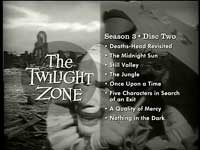 | 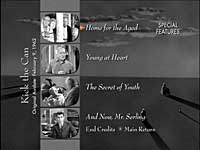 |  |
Of note, the episodes are closed captioned for the hearing impaired, but not the special features.
WHISTLES & BELLS:
This release of the third season includes mostly the same style of features as the first two releases: audio commentaries from stars and directors, recently produced radio dramas, excerpts from Marc Scott Zicree's interviews when researching his book The Twilight Zone Companion, and isolated scores from various composers. Like the second season release, no more material from the Rod Serling lectures at Sherwood Oaks College is included, which is a disappointment. One new addition to this set, however, is clips from the 1985 and 2002 remakes of a couple of the episodes.
COMMENTARIES
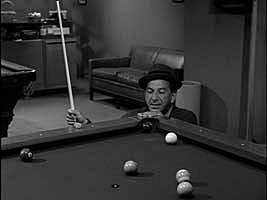 This third season boasts the largest number of audio commentaries with 6 full-length inclusions and a short 5-minute piece with Leonard Nimoy. The first of these accompanies "A Game of Pool" and is provided by Jonathan Winters, who stars in the episode as Fats Brown. Much like Robin Williams, Winters is very improvisational and all over the place. While that may be interesting for a stage show, it comes across just rambling and annoying on this commentary. He gets sidetracked with countless incomplete and confusing metaphors and talks quite little about the episode itself. As one of my favorites in the series, I was unhappy that he essentially provided no additional information about how it was produced.
This third season boasts the largest number of audio commentaries with 6 full-length inclusions and a short 5-minute piece with Leonard Nimoy. The first of these accompanies "A Game of Pool" and is provided by Jonathan Winters, who stars in the episode as Fats Brown. Much like Robin Williams, Winters is very improvisational and all over the place. While that may be interesting for a stage show, it comes across just rambling and annoying on this commentary. He gets sidetracked with countless incomplete and confusing metaphors and talks quite little about the episode itself. As one of my favorites in the series, I was unhappy that he essentially provided no additional information about how it was produced.
Bill Mumy adds background for "It's a Good Life" where he stars as little Anthony Freemont. Mumy is always an interesting character, and this commentary allows more of his personality to come out. Unfortunately, he loves this episode so much that he cannot help repeatedly quoting the episode instead of commenting on it. Endearing at first, it becomes like watching Monty Python and the Holy Grail with a group of intoxicated college students. He does share some insight into his experience working with director James Sheldon as well as commenting how he likes to wish people to the cornfield when they make him made in real life. True to form, like his commentary on "Long Distance Call", he's quick to point out an editing error where the part in his hair switches back and forth.
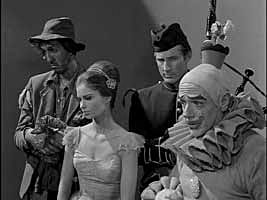 "The Midnight Sun" is assisted by Lois Nettleton, and this is easily the best of the set. She pauses briefly during key dialogue moments of the show and provides a good balance of personal background as well as insight to this particular episode. It is clear that she is genuinely interested in the work and had a wonderful experience on the show, and it makes for an entertaining experience for the viewer. Her biggest praise for the work is that the director and producer were keenly aware of letting characters have the time "just be" instead of bombarding them with excess action just to increase the pace.
"The Midnight Sun" is assisted by Lois Nettleton, and this is easily the best of the set. She pauses briefly during key dialogue moments of the show and provides a good balance of personal background as well as insight to this particular episode. It is clear that she is genuinely interested in the work and had a wonderful experience on the show, and it makes for an entertaining experience for the viewer. Her biggest praise for the work is that the director and producer were keenly aware of letting characters have the time "just be" instead of bombarding them with excess action just to increase the pace.
William Windom, "The Major" in "Five Characters in Search of an Exit", adds commentary to his episode, and it is moderately interesting. He talks about the casting of the show and how he and co-star Susan Harrison fought over who would have top billing. Sadly, he rags on television as a medium, repeatedly calling it "minor league", an assertion that does not go over too well with a certain reviewer.
Leonard Nimoy has a brief appearance at the open of "A Quality of Mercy", and as such, he only provides audio for the first 5 minutes of the episode. This is very disappointing, as Nimoy is quite interesting in those 5 minutes, and I suspect a 30-minute explanation of how he trimmed his nose hairs one morning would be entertaining enough to warrant attention. In his short time, he covers how it is difficult for an actor to create and maintain a character when he's doing a bunch of bit parts on various television series.
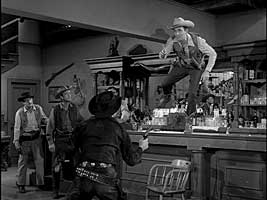 As Larry Blyden passed away in 1975 and Arch Johnson in 1997, Robert Cornthwaite was the only one available to comment on "Showdown with Rance McGrew". Portraying the director in the episode, his role was small, so he doesn't have too much to offer about the specific episode. However, he does have some interesting information to share about the nature of Hollywood in the 1960s and how much respect and admiration he had for Serling.
As Larry Blyden passed away in 1975 and Arch Johnson in 1997, Robert Cornthwaite was the only one available to comment on "Showdown with Rance McGrew". Portraying the director in the episode, his role was small, so he doesn't have too much to offer about the specific episode. However, he does have some interesting information to share about the nature of Hollywood in the 1960s and how much respect and admiration he had for Serling.
The final commentary comes from Cliff Robertson, star of "The Dummy". Shockingly, this commentary is terrible. His insight on "A Hundred Yards Over the Rim" for the season two set was wonderful, but this one exhibits almost no enthusiasm, and there are significant gaps of silence. To fill the empty time, he even retells his near-death experience story, this time attributing it to this episode.
On the whole, these commentaries, while high in number, are not as strong as the previous release. The only ones truly worthy of a listen are Lois Nettleton on "The Midnight Sun", Bill Mumy for "It's a Good Life" and the short piece from Leonard Nimoy on "A Quality of Mercy".
RADIO DRAMAS
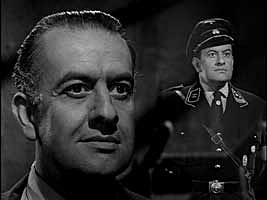 Once again, there are 6 radio dramas included on this set, some more interesting than others. The first is for "The Passersby" (36:41), and it begs one simple question: why? Regarded by most as a terrible episode, extending it by 10 minutes and producing it for radio does not strike me as a particularly bright idea. The climax of the original is largely visual, and the attempt to recreate it for audio comes across just as silly. Worse, the Southern accents presented are far from believable. Again, the question remains: why?
Once again, there are 6 radio dramas included on this set, some more interesting than others. The first is for "The Passersby" (36:41), and it begs one simple question: why? Regarded by most as a terrible episode, extending it by 10 minutes and producing it for radio does not strike me as a particularly bright idea. The climax of the original is largely visual, and the attempt to recreate it for audio comes across just as silly. Worse, the Southern accents presented are far from believable. Again, the question remains: why?
"Deaths-Head Revisited" (41:27) stars H.M. Wynant as the S.S. Captain, and while his performance isn't as intense as Oscar Beregi's from the original, the writing fleshes out his character quite a bit more, and the whole thing flows better with more continuity and dramatic believability. Adding the character of a taxi driver, and establishing Lutze's guise as a "historian" improves the story, and while it's still a little forceful, it's far less preachy and much more effective than the original.
"Still Valley" (38:52) is another curious choice. As one of the sillier episodes, it is not a particularly great selection for reproduction, and it is near impossible to avoid laughing at Adam West's performance as a Confederate scout. To their credit, the episode has been substantially rewritten, not only to have it make some sense in an audio format but also to eliminate the ridiculous plot hole from the original.
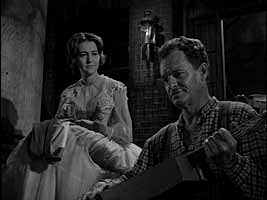 Morgan Brittney, voice star for "The Passersby" returns for "One More Pallbearer" (40:36). Like many of the others, some rewrites to the script address annoyances from the original. In this case, the three victims of Radin's game at least consider the possibility that the whole thing is a hoax. In the original, they just go along with everything without question. The story is also lengthened to include some unnecessary exposition about the nature of humanity, and the fake news reports have been enhanced to sound much more realistic. Although somewhat improved, it is not enough to make it worthwhile.
Morgan Brittney, voice star for "The Passersby" returns for "One More Pallbearer" (40:36). Like many of the others, some rewrites to the script address annoyances from the original. In this case, the three victims of Radin's game at least consider the possibility that the whole thing is a hoax. In the original, they just go along with everything without question. The story is also lengthened to include some unnecessary exposition about the nature of humanity, and the fake news reports have been enhanced to sound much more realistic. Although somewhat improved, it is not enough to make it worthwhile.
Stan Freberg gives life to Oliver Crangle in the radio interpretation of "Four O'Clock" (47:41). For this one, the story is mostly the same, except it has been padded to almost twice the original length! The extra material comes from numerous additional schemes that Crangle considers as well as a long sequence with him scanning the television for news of his plan and his late attempt to alert the media. A shorter version may have been effective, but this one proves to be just too long for its own good.
Finally, "The Dummy" (36:08) is presented with Bruno Kirby doing the voices of ventriloquist Jerry Etherson as well as his dummies, Willy and Goofy. The writing for this radio drama is pretty creative, providing some context clues like "knocking on wood" and referencing the dummy sitting on crossed legs, so that it is possible for the audience to comprehend what is happening during the tale's big finale. One notable change for this drama is that the comedy routine is intentionally bad. In the original, it was somewhat amusing, but here Etherson is characterized as more of a failure in his craft. I'm not sure the change works.
Each of these radio dramas has something redeeming to it, but for the most part, they are largely forgettable.
INTERVIEWS
In this third season, there is essentially the same amount of interview material as the second release, much of it coming from producer Buck Houghton. These are continuations of the same interview material featured on the first and second sets and come from Marc Scott Zicree's personal research into his essential textbook for the show.
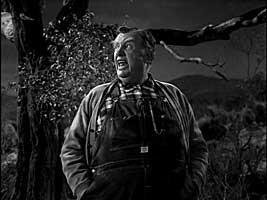 Producer Buck Houghton was one of the primary creative forces for The Twilight Zone, and he adds insight behind 5 of the episodes on this set. For "A Game of Pool", only 3 minutes of material is included, mostly discussing how they had a hard time deciding which ending to use and how Jonathan Winters was an interesting personality. "Deaths-Head Revisited" includes more Buck with just under 10 minutes largely covering Don Medford's directorial style and sense of pacing. For "A Piano in the House", he talks for 6 minutes about how writer Earl Hamner, Jr. got involved with the show and why episode titles are sometimes changed. 6 more minutes are included for "The Little People", where Houghton discusses the way certain special effects were accomplished. Finally, on "I Sing the Body Electric", Houghton speaks for almost 14 minutes on how they had to keep re-shooting numerous scenes to get the story right and why certain science fiction authors of the time understandably resented Serling's success. Lastly, he talks about why this season was his last and why he ultimately moved on to other projects. Buck Houghton was a driving force in the creation of The Twilight Zone, and while his memory is not the proverbial steel trap with regard to the show, he does remember quite a bit, and it is essential information for any fan of the series.
Producer Buck Houghton was one of the primary creative forces for The Twilight Zone, and he adds insight behind 5 of the episodes on this set. For "A Game of Pool", only 3 minutes of material is included, mostly discussing how they had a hard time deciding which ending to use and how Jonathan Winters was an interesting personality. "Deaths-Head Revisited" includes more Buck with just under 10 minutes largely covering Don Medford's directorial style and sense of pacing. For "A Piano in the House", he talks for 6 minutes about how writer Earl Hamner, Jr. got involved with the show and why episode titles are sometimes changed. 6 more minutes are included for "The Little People", where Houghton discusses the way certain special effects were accomplished. Finally, on "I Sing the Body Electric", Houghton speaks for almost 14 minutes on how they had to keep re-shooting numerous scenes to get the story right and why certain science fiction authors of the time understandably resented Serling's success. Lastly, he talks about why this season was his last and why he ultimately moved on to other projects. Buck Houghton was a driving force in the creation of The Twilight Zone, and while his memory is not the proverbial steel trap with regard to the show, he does remember quite a bit, and it is essential information for any fan of the series.
"A Game of Pool" includes a second interview segment with director Buzz Kulik, who talks with Zicree for about 8 and a half minutes on what a gamble it was to cast Jonathan Winters in such a dramatic role. He also discusses how it is the responsibility of the director to figure out what makes each individual actor tick and to tap into that for a great performance. "A Piano in the House" also includes a second interview, 5 minutes with writer Earl Hamner, Jr., where he admits that he overly stereotyped the character of the theater critic to the detriment of the episode. Hamner also talks for about 10 minutes on his episode, "The Hunt". Mainly this covers his fondness for homespun characters and his personal relationship with Rod Serling.
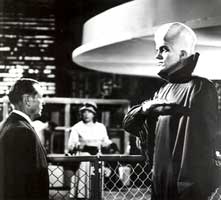 Director Lamont Johnson has two segments as well: 9 minutes on "Five Characters in Search of an Exit" and 15 minutes on "Nothing in the Dark". He notes that "Five Characters" is his favorite episode of the show and talks about how it didn't require space or aliens. His passion as a director is evident, and it is definitely worth the effort to listen. For "Nothing in the Dark", his comments mostly relate to Buck Houghton's style as a producer as well as what it was like to work with Robert Redford.
Director Lamont Johnson has two segments as well: 9 minutes on "Five Characters in Search of an Exit" and 15 minutes on "Nothing in the Dark". He notes that "Five Characters" is his favorite episode of the show and talks about how it didn't require space or aliens. His passion as a director is evident, and it is definitely worth the effort to listen. For "Nothing in the Dark", his comments mostly relate to Buck Houghton's style as a producer as well as what it was like to work with Robert Redford.
Also from "Nothing in the Dark" is a very short minute-and-a-half piece from writer George Clayton Johnson. He has just enough time to credit Charles Beaumont for breaking his writer's block and notes that he thinks the episode is a masterpiece.
The final interview segment is 11 minutes with director Richard L. Bare on "To Serve Man". This is more footage from the restaurant interview from the season one set, and the clanging of dishes and laughter of patrons is a tad distracting. Also, as can be heard on this segment, his wife is present and makes a few brief comments about the show. Some of the more interesting material from this interview relates to the decline of MGM as a studio.
As with the other seasons, much of this interview material is already included in Zicree's guide, so a lot of it will be familiar if you have already read the book. Still, there are little nuggets of insight here and there, and since these individuals are the ones most creatively responsible for the episodes, it is worth the time to examine their comments and hear them in their own words.
CLIPS
New to this set are 3 clips from future remakes of episodes in this season. The first clip is from the 1989 remake of "A Game of Pool" starring Esai Morales (Jesse Cardiff) and Maury Chaykin (Fats Brown). The clip runs for about 2 and a half minutes and shows George Clayton Johnson's original ending in the first revision of the script. Personally, I don't think this ending is as effective as the one that aired, but it is interesting to see nonetheless.
For "It's a Good Life", there is a clip from the 2003 "sequel" "It's Still a Good Life" that reunites Bill Mumy with Cloris Leachman and introduces Liliana Mumy as Anthony Freemont's daughter. The clip only runs for about a minute and isn't overly interesting; however, Bill Mumy does provide an extra commentary track that runs for 3 minutes (longer than the clip) where he talks about what it was like to work on this project and how much he treasured the experience. In this short burst, this is better than the commentary for the original episode.
Finally, following "Dead Man's Shoes" is a clip from the 1985 remake "Dead Woman's Shoes" with Jeffrey Tambor and Helen Mirren. Lasting just under 3 minutes, this clip is terribly uninteresting and serves as little more than a teaser for the other DVD set. Even with these short segments, it is clear how much is lost when moving from black-and-white to color.
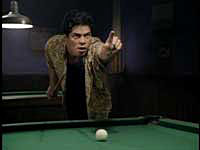 | 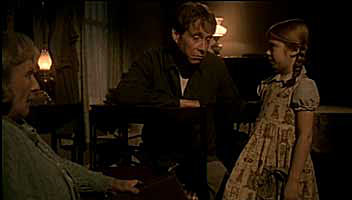 | 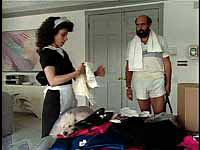 |
ISOLATED SCORES
The final significant extra features are the isolated scores for 30 of the 37 episodes! Like the previous sets, pretty much every episode that wasn't scored with stock CBS music is presented as an alternate track on the discs, including some of the stock music as well. This is a wonderful treat for fans of this unique art form, and the great work of Bernard Herrmann on "Little Girl Lost" is included as well as Van Cleave on "The Midnight Sun". Also noteworthy are William Lava's unique interpretations on "Once Upon a Time" and Laurindo Almeida's great but wasted work on "The Gift".
OTHER MATERIAL
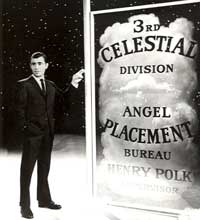 Once again, Image Entertainment has taken care to provide even more additional material, some scattered throughout the discs, but most gathered together on the end of Disc 5. On the first disc with "A Game of Pool", there is a short piece with Jonathan Winters reading the Johnson's original ending from the script. While doing so, images from the actual episode are spliced together in such a way that it somewhat matches what is being read. It's certainly not perfect, but it gives a real close idea of what Johnson had originally envisioned. For as confusing as Winters is in his commentary, he does a wonderful job interpreting this segment of the script.
Once again, Image Entertainment has taken care to provide even more additional material, some scattered throughout the discs, but most gathered together on the end of Disc 5. On the first disc with "A Game of Pool", there is a short piece with Jonathan Winters reading the Johnson's original ending from the script. While doing so, images from the actual episode are spliced together in such a way that it somewhat matches what is being read. It's certainly not perfect, but it gives a real close idea of what Johnson had originally envisioned. For as confusing as Winters is in his commentary, he does a wonderful job interpreting this segment of the script.
For "Cavender is Coming", there is a 9 minute piece from a 1961 episode of The Gary Moore Show. Carol Burnett was featured on this show as a regular for about 3 years, and it made for a perfect cross-promotional opportunity for her Twilight Zone episode. The sketch on the show is called "The Twi-Night Zone" and features a brief introduction by Mr. Serling followed by a somewhat amusing parody of The Twilight Zone. The print is pretty damaged, and it is not as entertaining as the Jack Benny Show clip from the second release, but it is still fun to see.
On the 5th disc is one of the more interesting additional features released thus far. Rod Serling presents a 5-minute promo for "The Famous Writers School", a home-study correspondence course (related to "The Famous Artists School" and "The Famous Photographers School") that purported to teach you how to be a successful writer. Much maligned as an ineffective sham, this "school" was in session throughout the 1960s and at one point grossed over $10 million a year in revenue and boasted over 50,000 students. The process was simple: first, you'd send in your aptitude test to the committee. If it was determined by a select panel of experts that you did in fact have a pulse and a valid mailing address, you would be presented with numerous opportunities to send them your money in exchange for textbooks and editing services. How effective this proved to be depends on the individual. If you were a 10-year-old kid at the time, submitting your "application" from an advertisement on the back of a magazine, you were quite disappointed to be "accepted". However, many well-known science fiction authors credit "The Famous Writers School" for helping them hone their craft and lead them to great careers. Regardless of your opinion of the business operation, this 5-minute promo is a wonderful inclusion from the archives and a slice of our television heritage you must see to believe.
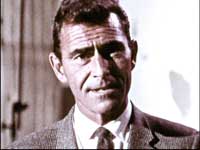 | 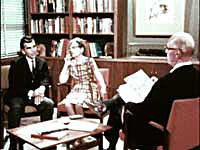 | 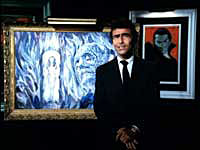 |
The rest of the 5th disc is made of up promotional spots, teasers, and billboards, not only for this season of the title series but for Night Gallery as well. The first set is 5 minutes of promotional pieces for the Sci Fi Channel (sic), some promoting their traditional Twilight Zone marathons and others promoting the "definitive" season one DVD release. As I have refused to watch the channel since August 23, 2002, I had personally never seen these before, so it was interesting to see a new interpretation on the episodic montage with various scenes from different episodes blended together for a short promotional piece.
Just under 7 minutes of billboards are included on this set, many of which have been seen on other releases, but some of them are new, including Mobil's "megatane" gasoline and Pepsi-Cola, "for those who think young!" For anyone wondering, Arrid is still fortified with PERSTOP! Also included is a photo gallery from the season that plays like a slide-show with 38 images from the production and behind the scenes.
As mentioned, there is an entire section for Night Gallery, a supernatural series that Rod Serling narrated in the early 1970s. The section has its own menu and features 2 and a half minutes of promos, 4 and a half minutes of bumpers, 30 seconds of "More to Come" teasers, 3 minutes of Serling's episodic introductions, and perhaps the strangest inclusion on these DVD sets to date: nearly 7 and a half minutes (!) of ... station IDs. "This is Rod Serling. Experience the unexplainable next on the Night Gallery, here on Channel 61. Finally, as with the previous two seasons, there is a comic book in .pdf format accessible from a DVD drive on a personal computer. This season's inclusion is "Hamilton's Creature" from August of 1964. CONCLUDING THOUGHTS: The final season produced by Buck Houghton, Season 3 of The Twilight Zone contains some of the show's finest efforts as well as some of Serling's most pretentious scripts. Better than the second season, but not as good as the first, most of the strong episodes come from George Clayton Johnson, Richard Matheson, Charles Beaumont, and Montgomery Pittman, as their burden of episodes was far less, and they had more time to make their scripts the best they could be. Still, despite being worn down and overworked, Serling still managed to produce more than his share of interesting tales this season, and it is worth wading through the stinkers to get to the gems. Much like the second season release, I am torn with how to recommend this title to others. The content of the episodes is much stronger than the previous season, but the extra features are not as good. Even so, there are countless hours of additional material from which any fan of the show should gain insight and enjoyment, and I am once more going to Highly Recommend this release with the caveat that it is more tailored to longtime fans of the series than the casual viewer. Included in the set are the following episodes:
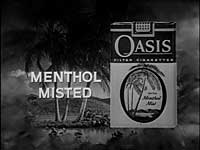
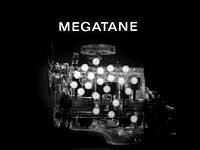

|
| Popular Reviews |
| Sponsored Links |
|
|
| Sponsored Links |
|
|
| Release List | Reviews | Shop | Newsletter | Forum | DVD Giveaways | Blu-Ray | Advertise |
|
Copyright 2024 DVDTalk.com All Rights Reserved. Legal Info, Privacy Policy, Terms of Use,
Manage Preferences,
Your Privacy Choices | |||||||









